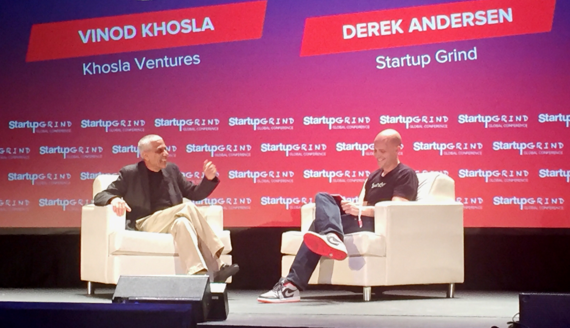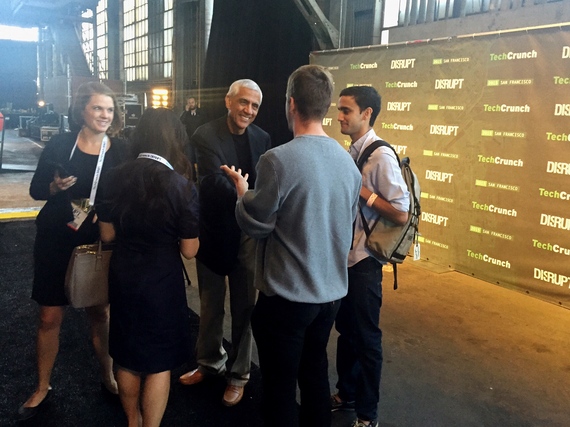"Everybody has a plan until they get punched in the mouth."
-- Mike Tyson
After a brief, memorable chat with Vinod Khosla last year at TechCrunch Disrupt, I was eager to see the legendary venture capitalist speak again this year at Startup Grind in Redwood City, California. When I asked him how to get feedback on discriminating between good ideas, he told me to ask people not why an idea is working, but instead to ask them why it is not working. This was valuable feedback for our startup at the time. Khosla repeatedly insisted that he was there to talk directly to the founders. That's why I decided to write up my notes and share his wisdom with the hope that even more entrepreneurs can benefit from his sage advice.
In his afternoon fireside with Derek Anderson, co-founder of Startup Grind, Khosla said that the most important decision as a founder is whom you want to partner with. That includes investment partners and your co-founders. In partnering with an investor, money is the least important thing you get. The purpose of an early stage investor is to have the founder think hard about the things they haven't thought about. Entrepreneur get better if they are sensitized to issues they are not exposed to naturally. Khosla insisted that you want to have an investor that pushes you hard. That means exposing possible risk in your business plan, both real and perceived risks. How do you know you have the right investor? When an investor pushes you and almost makes you feel uncomfortable. "If I haven't doubled the potential of a startup then I as an investor haven't done my job," he said.
Khosla also drew a clear line on who should make the decisions in an early-stage venture. In most cases, it is the founders. "Nobody who comes in once every six weeks while you're working 80 or 90 hours a week is qualified to make a decision," he said. Khosla believes that in a small company a board shouldn't do much. If someone is not in the trenches with the founders, they are not qualified to make decisions. The board should push them hard and make them think. Unfortunately, most investors want to be nice and polite. As a founder, you need to understand that you are the one who is driving the company.
Not just for investors, but for any hire, get people around you that push you in a constructive way. "A company becomes the people it hires," he said. Another way to help as an investor is helping them to get the right team. What a company plans is then almost irrelevant. Plans are only important in the sense that they help you think hard about all your risks and prevent them by building firewalls in advance.
He also briefly talked about the distinction between a manager and a founder. What distinguishes the two is that the founder has a belief system, whereas good managers don't. As a founder you set the value and belief system. What makes for a good manager makes for a bad entrepreneur
When Khosla does have a meeting he measures it. According to him, if he takes up 2-3 hours of time of a founder, he better walk out with questions that are important to their business. He also mentioned that instinct and intuition are important for founders to maintain. Therefore keeping those two things intact is important.
In most cases founders shouldn't follow the advice they are getting. What not to do is equally important to what you need to do. The best advice is that you have constantly someone, either yourself or others, and ideally both that challenge your assumptions.
As a startup it is important to keep you burn rate small, and only raise money when you have a business that is read to scale. "People who get a lot of money reduce their probability of success," he said.
As a closing note, when he was asked what drives him at this stage in his life, he said that he is internally driven, whereas most people are externally driven. The way he makes a decision, he asks himself, "What's fun for me?" He is motivated for the most successful startup to have a real impact. In that sense brainstorming a new idea is more fun than watching a movie. And spending time on things that are socially impactful sounds like a lot of fun indeed.


